https://github.com/go-dev-frame/sponge
A powerful Go development framework for developing RESTful APIs, gRPC, and microservices projects in a "low-code" manner.
https://github.com/go-dev-frame/sponge
cloud-native code-generation custom-templates developer-tools gin go-sponge golang grpc grpc-gateway low-code microservice restful-api sponge web
Last synced: 8 months ago
JSON representation
A powerful Go development framework for developing RESTful APIs, gRPC, and microservices projects in a "low-code" manner.
- Host: GitHub
- URL: https://github.com/go-dev-frame/sponge
- Owner: go-dev-frame
- License: mit
- Created: 2022-09-19T15:18:07.000Z (over 3 years ago)
- Default Branch: main
- Last Pushed: 2025-03-02T13:09:43.000Z (11 months ago)
- Last Synced: 2025-04-04T08:43:06.791Z (10 months ago)
- Topics: cloud-native, code-generation, custom-templates, developer-tools, gin, go-sponge, golang, grpc, grpc-gateway, low-code, microservice, restful-api, sponge, web
- Language: Go
- Homepage: https://go-sponge.com
- Size: 17.1 MB
- Stars: 1,715
- Watchers: 18
- Forks: 174
- Open Issues: 26
-
Metadata Files:
- Readme: README.md
- License: LICENSE
Awesome Lists containing this project
- awesome-go - go-dev-frame/sponge - to-use Go development framework that enables you to effortlessly build stable, reliable, and high-performance backend services with a "low-code" approach. ☆`2,711` (Distributed Systems / Search and Analytic Databases)
README
## English | [简体中文](assets/readme-cn.md)

[](https://goreportcard.com/report/github.com/go-dev-frame/sponge)
[](https://codecov.io/gh/go-dev-frame/sponge)
[](https://pkg.go.dev/github.com/go-dev-frame/sponge)
[](https://github.com/go-dev-frame/sponge/actions)
[](https://github.com/avelino/awesome-go)
[](https://img.shields.io/github/license/go-dev-frame/sponge)
**Sponge** is a powerful `Go` development framework. Its core concept is to generate modular code by parsing `SQL`, `Protobuf`, or `JSON` files in reverse, these modular codes can be flexibly combined into various types of complete backend services (`similar to the characteristics of sponge cells, where disassembled sponge cells can automatically recombine into a new sponge`).
Sponge offers outstanding project engineering capabilities, providing an all-in-one project development solution that covers code generation, development, testing, API documentation generation, and deployment. Sponge deeply integrates a modular architecture with an AI assistant to significantly enhance development efficiency and reduce technical barriers, empowering developers to easily build stable and reliable backend systems using a "low-code" approach.
### Applicable Scenarios
Sponge is suitable for rapidly building various types of high-performance backend services, including but not limited to:
- `RESTful API` services
- `Web` services (Gin-based)
- `gRPC` services
- `HTTP+gRPC` hybrid services
- `gRPC Gateway API` services
- `cloud-native` microservices
Additionally, developers can use custom templates to generate various types of code to meet specific business needs.
### Core Advantages
1. **One-click generation of complete backend service code**
For `Web` or `gRPC` services that only require `CRUD APIs`, no `Go` code needs to be written. Simply connect to a database (e.g., `MySQL`, `MongoDB`, `PostgreSQL`, `SQLite`) to one-click generate complete backend service code and easily deploy it to Linux servers, Docker, or Kubernetes.
2. **Efficient development of general-purpose services**
When developing general-purpose `Web`, `gRPC`, `HTTP+gRPC`, or `gRPC Gateway` services, you only need to focus on three aspects:
- Defining database tables;
- Defining API descriptions in Protobuf files;
- In the generated templates, use built-in AI assistants or manually write business logic code.
The framework code and CRUD API code are all automatically generated by sponge.
3. **Support for custom templates, offering flexible extensibility**
Sponge supports generating various types of project-specific code using custom templates, not limited to the `Go` language. For example:
- Backend code;
- Frontend code;
- Configuration files;
- Test code;
- Build and deployment scripts, etc.
4. **Generate code on the page, simple and easy to use**
Sponge provides code generation on the page, avoiding complex command-line operations, simply filling in parameters on the page to generate code with one click.
5. **Sponge collaborate with the AI assistants for a closed-loop development process**
Sponge deeply integrates with built-in AI assistants (DeepSeek, ChatGPT, Gemini) to form a complete and highly efficient development solution:
- **Sponge**: Handles infrastructure code generation (service framework, CRUD API interfaces, and custom API interfaces code without business logic implementation).
- **AI assistant**: Focuses on business logic implementation (table structure DDL design, custom API interface definition, and business logic implementation code).
### Quick Start
1. **Install sponge**
Sponge supports installation on Windows, macOS, and Linux. Click to view the [**sponge installation guide**](https://github.com/go-dev-frame/sponge/blob/main/assets/install-en.md).
2. **Open the code generation UI**
After installation, run the following command to open the sponge UI:
```bash
sponge run
```
Access `http://localhost:24631` in a local browser to generate code through the UI interface, as shown below:
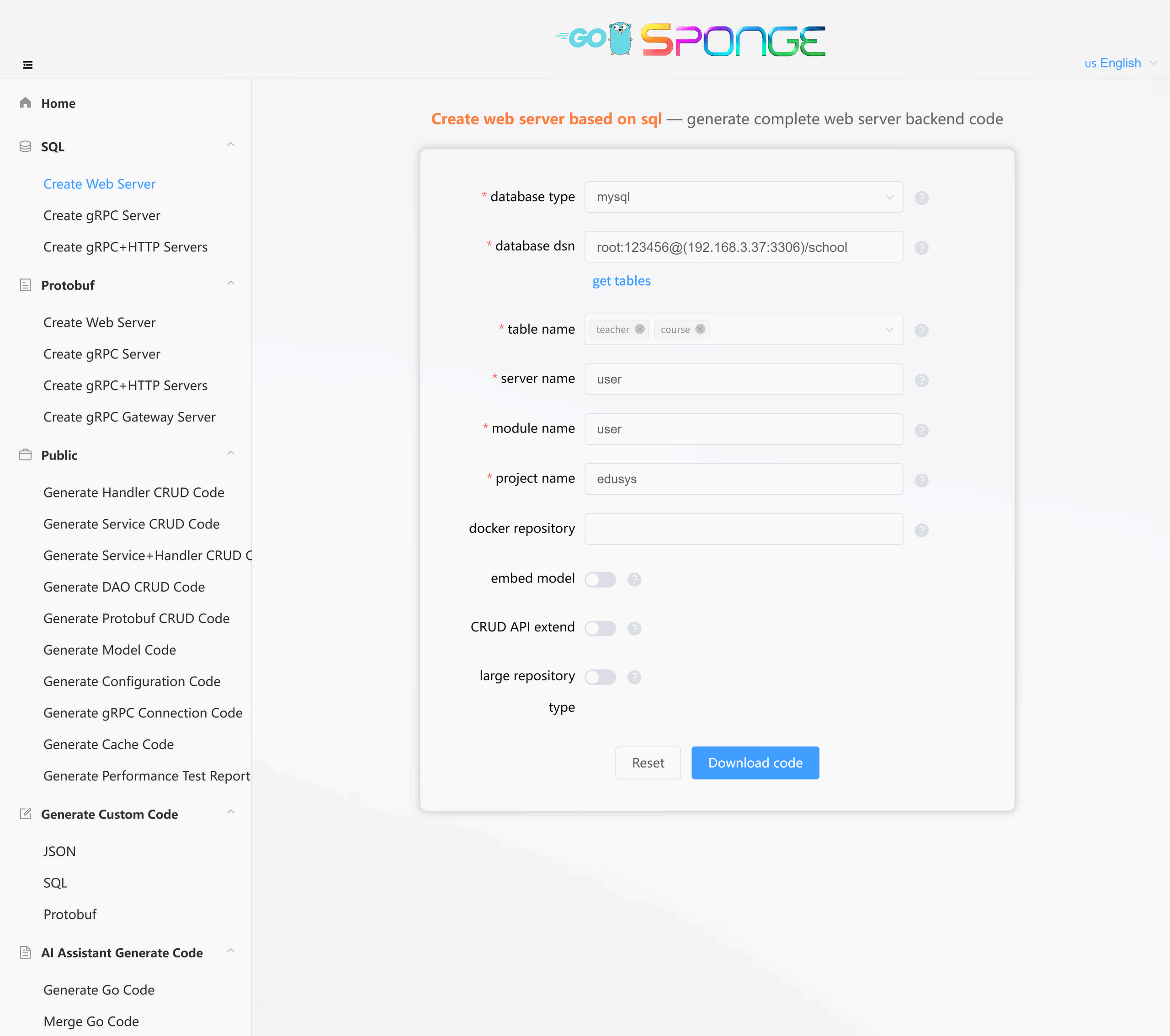
> To access from a browser on a different host, specify the host IP or domain when starting the UI, e.g., `sponge run -a http://your_host_ip:24631`. Alternatively, you can run the UI service in Docker to support cross-host access. Click to view the guide on [running the sponge UI service in Docker](https://github.com/go-dev-frame/sponge/blob/main/assets/install-en.md#Docker%E7%8E%AF%E5%A2%83).
### Main Features
Sponge has built-in rich components (for on-demand use):
| Components | Examples |
| :--- | :-------- |
| Web framework [gin](https://github.com/gin-gonic/gin) | [gin example](https://github.com/go-dev-frame/sponge/blob/main/internal/routers/routers.go#L35)
[gin middleware examples](https://github.com/go-dev-frame/sponge/blob/main/pkg/gin/middleware/README.md) |
| RPC framework [gRPC](https://github.com/grpc/grpc-go) | [gRPC example](https://github.com/go-dev-frame/sponge/blob/main/internal/server/grpc.go#L312)
[gRPC interceptor examples](https://github.com/go-dev-frame/sponge/blob/main/pkg/grpc/interceptor/README.md) |
| Configuration parsing [viper](https://github.com/spf13/viper) | [example](https://github.com/go-dev-frame/sponge/blob/main/pkg/conf/README.md#example-of-use) |
| Logging [zap](https://github.com/uber-go/zap) | [example](https://github.com/go-dev-frame/sponge/blob/main/pkg/logger/README.md#example-of-use) |
| ORM [gorm](https://github.com/go-gorm/gorm), [mongo-go-driver](https://github.com/mongodb/mongo-go-driver) | [gorm example](https://github.com/go-dev-frame/sponge/blob/main/pkg/sgorm/README.md#examples-of-use)
[mongodb example](https://github.com/go-dev-frame/sponge/blob/main/pkg/mgo/README.md#example-of-use) |
| Cache [go-redis](https://github.com/go-redis/redis), [ristretto](https://github.com/dgraph-io/ristretto) | [go-redis example](https://github.com/go-dev-frame/sponge/blob/main/pkg/goredis/README.md#example-of-use)
[ristretto example](https://github.com/go-dev-frame/sponge/blob/main/pkg/cache/memory.go#L25) |
| Automated API documentation [swagger](https://github.com/swaggo/swag), [protoc-gen-openapiv2](https://github.com/grpc-ecosystem/grpc-gateway/v2/protoc-gen-openapiv2) | - |
| Authentication [jwt](https://github.com/golang-jwt/jwt) | [jwt example](https://github.com/go-dev-frame/sponge/blob/main/pkg/jwt/README.md#example-of-use)
[gin example](https://github.com/go-dev-frame/sponge/blob/main/pkg/gin/middleware/README.md#jwt-authorization-middleware)
[gRPC example](https://github.com/go-dev-frame/sponge/blob/main/pkg/grpc/interceptor/README.md#jwt-authentication-interceptor) |
| Parameter [validator](https://github.com/go-playground/validator), [protoc-gen-validate](https://github.com/bufbuild/protoc-gen-validate) | [validator example](https://github.com/go-dev-frame/sponge/blob/main/internal/types/userExample_types.go#L17)
[protoc-gen-validate example](https://github.com/go-dev-frame/sponge/blob/main/api/serverNameExample/v1/userExample.proto#L156) |
| Websocket [gorilla/websocket](https://github.com/gorilla/websocket) | [example](https://github.com/go-dev-frame/sponge/blob/main/pkg/ws/README.md#example-of-use) |
| Crontab [cron](https://github.com/robfig/cron) | [example](https://github.com/go-dev-frame/sponge/blob/main/pkg/gocron/README.md#example-of-use) |
| Message Queue [rabbitmq](https://github.com/rabbitmq/amqp091-go), [kafka](https://github.com/IBM/sarama) | [rabbitmq example](https://github.com/go-dev-frame/sponge/blob/main/pkg/rabbitmq/README.md#example-of-use)
[kafka example](https://github.com/go-dev-frame/sponge/blob/main/pkg/kafka/README.md#example-of-use) |
| Distributed transaction manager [dtm](https://github.com/dtm-labs/dtm) | [dtm service discovery example](https://github.com/go-dev-frame/sponge_examples/blob/main/_11_sponge-dtm-service-registration-discovery/internal/rpcclient/dtmservice.go#L31)
[dtm flash sale example](https://github.com/go-dev-frame/sponge_examples/blob/main/_12_sponge-dtm-flashSale/grpc%2Bhttp/internal/service/flashSale.go#L67) |
| Distributed lock [dlock](https://github.com/go-dev-frame/sponge/tree/main/pkg/dlock) | [example](https://github.com/go-dev-frame/sponge/blob/main/pkg/dlock/README.md#example-of-use) |
| Adaptive rate limiting [ratelimit](https://github.com/go-dev-frame/sponge/tree/main/pkg/shield/ratelimit) | [gin example](https://github.com/go-dev-frame/sponge/blob/main/pkg/gin/middleware/README.md#rate-limiter-middleware)
[gRPC example](https://github.com/go-dev-frame/sponge/blob/main/pkg/gin/middleware/README.md#rate-limiter-interceptor) | |
| Adaptive circuit breaking [circuitbreaker](https://github.com/go-dev-frame/sponge/tree/main/pkg/shield/circuitbreaker) | [gin example](https://github.com/go-dev-frame/sponge/blob/main/pkg/gin/middleware/README.md#circuit-breaker-middleware)
[gRPC example](https://github.com/go-dev-frame/sponge/blob/main/pkg/grpc/interceptor/README.md#circuit-breaker-interceptor) | |
| Distributed tracing [opentelemetry](https://github.com/open-telemetry/opentelemetry-go) | [gin example](https://github.com/go-dev-frame/sponge/blob/main/pkg/gin/middleware/README.md#tracing-middleware)
[gRPC example](https://github.com/go-dev-frame/sponge/blob/main/pkg/grpc/interceptor/README.md#tracing-interceptor)
[cross-service tracing example](https://github.com/go-dev-frame/sponge/blob/main/pkg/tracer/example-en.md) |
| Metrics monitoring [prometheus](https://github.com/prometheus/client_golang/prometheus), [grafana](https://github.com/grafana/grafana) | [gin example](https://github.com/go-dev-frame/sponge/blob/main/pkg/gin/middleware/metrics/README.md#example-of-use)
[gRPC example](https://github.com/go-dev-frame/sponge/blob/main/pkg/grpc/metrics/README.md#example-of-use)
[web and gRPC monitor example](https://github.com/go-dev-frame/sponge/blob/main/pkg/grpc/metrics/monitor-example-en.md) |
| Service registration and discovery [etcd](https://github.com/etcd-io/etcd), [consul](https://github.com/hashicorp/consul), [nacos](https://github.com/alibaba/nacos) | [service registration example](https://github.com/go-dev-frame/sponge/blob/main/pkg/servicerd/registry/README.md#example-of-use)
[service discovery example](https://github.com/go-dev-frame/sponge/blob/main/pkg/servicerd/discovery/README.md#example-of-use) |
| Adaptive collecting [profile](https://go.dev/blog/pprof) | [example](https://github.com/go-dev-frame/sponge/blob/main/pkg/prof/go-profile-en.md) |
| Resource statistics [gopsutil](https://github.com/shirou/gopsutil) | [example](https://github.com/go-dev-frame/sponge/tree/main/pkg/stat#example-of-use) |
| Configuration cente [nacos](https://github.com/alibaba/nacos) | [example](https://go-sponge.com/components?id=configuration-center) |
| Code quality checking [golangci-lint](https://github.com/golangci/golangci-lint) | - |
| Continuous integration and deployment CI/CD [kubernetes](https://github.com/kubernetes/kubernetes), [docker](https://www.docker.com/), [jenkins](https://github.com/jenkinsci/jenkins) | [example](https://go-sponge.com/deployment?id=continuous-integration-and-deployment) |
| Generate project business architecture diagram [spograph](https://github.com/go-dev-frame/spograph) | [example](https://github.com/go-dev-frame/spograph?tab=readme-ov-file#example-of-use) |
| Custom template generation code [go template](https://pkg.go.dev/text/template@go1.23.3) | [json example](https://go-sponge.com/custom-template-field)
[sql example](https://go-sponge.com/custom-template-sql)
[protobuf example](https://go-sponge.com/custom-template-protobuf) |
| AI assistant [DeepSeek](https://deepseek.com), [ChatGPT](https://chatgpt.com), [Gemini](https://gemini.google.com) | [example](https://github.com/go-dev-frame/sponge/blob/main/cmd/sponge/commands/assistant/generate.go#L44) |
### Code Generation Engine
The code generation engine of sponge supports two methods for generating the required project code: **built-in templates** and **custom templates**. Below are the framework diagrams for both approaches.
1. The framework for code generation based on built-in templates in sponge is shown below, supporting both SQL and Protobuf formats.

2. The framework for code generation based on custom templates in sponge is shown below, supporting JSON, SQL, and Protobuf formats.
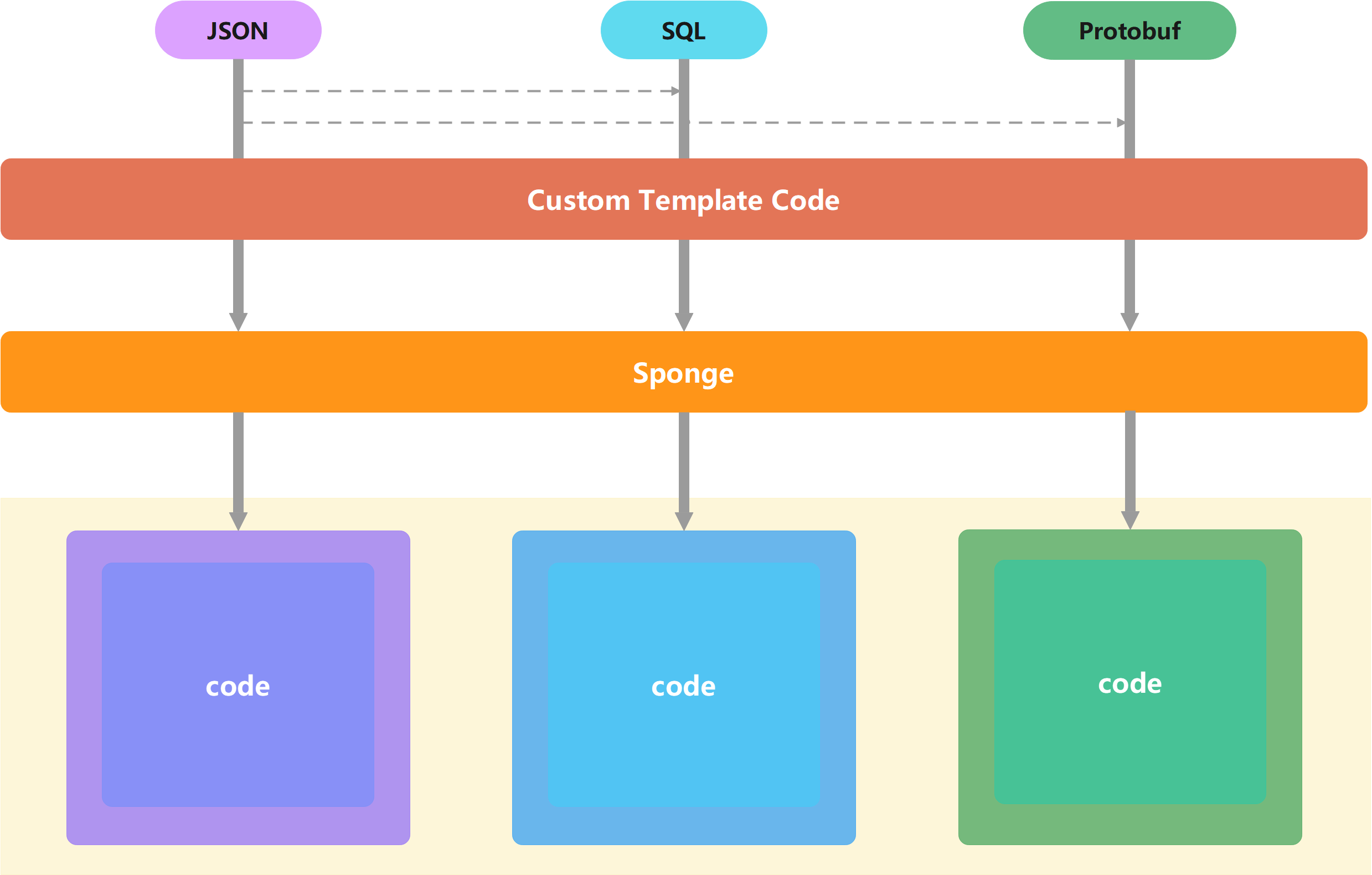
3. Sponge generates business logic code framework based on function description information, as shown in the following figure:
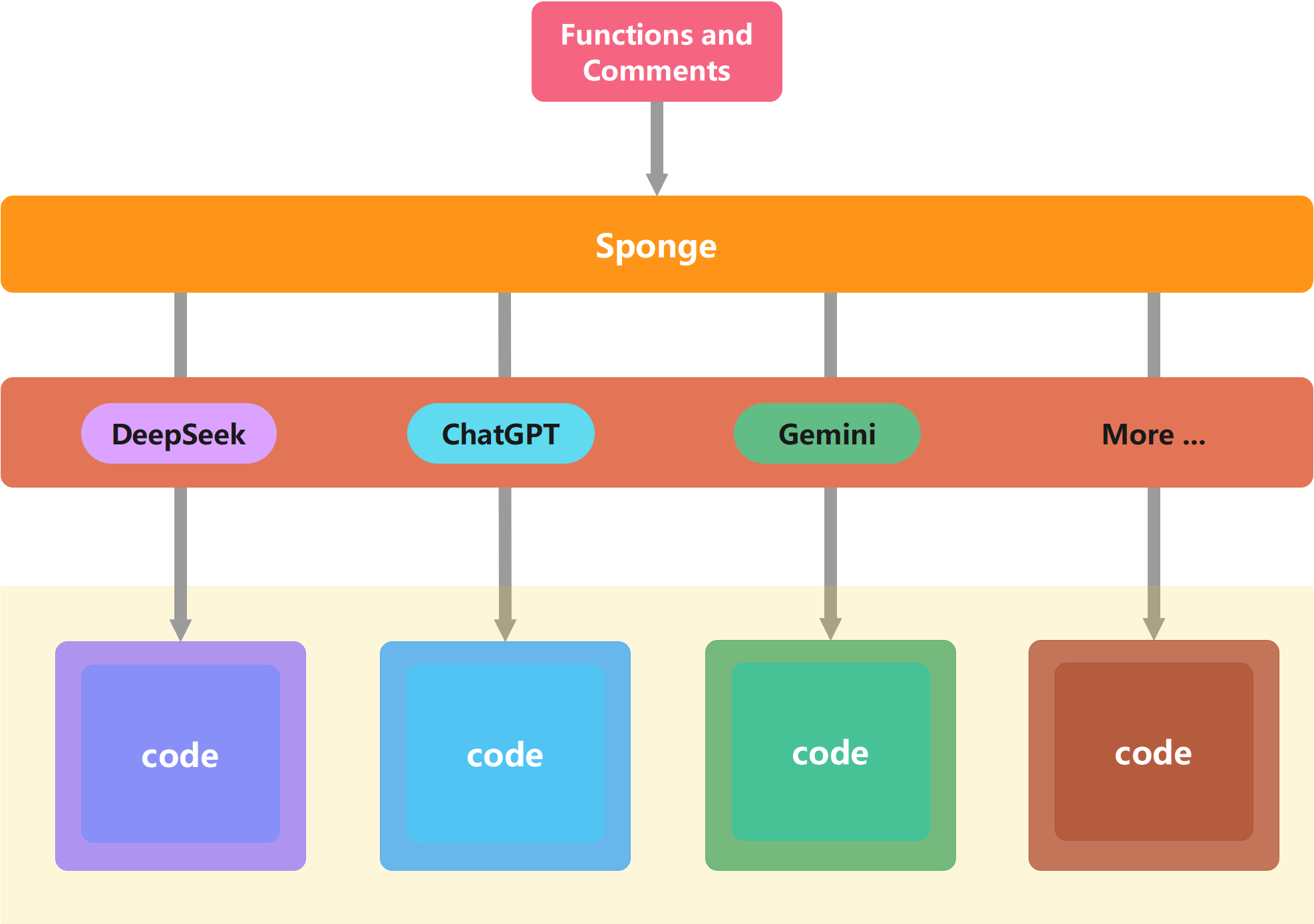
### Microservice framework
Back-end services created by sponge are typical microservice architectures. The diagram below illustrates a typical layered microservice structure, featuring high performance, scalability, and built-in service governance capabilities.
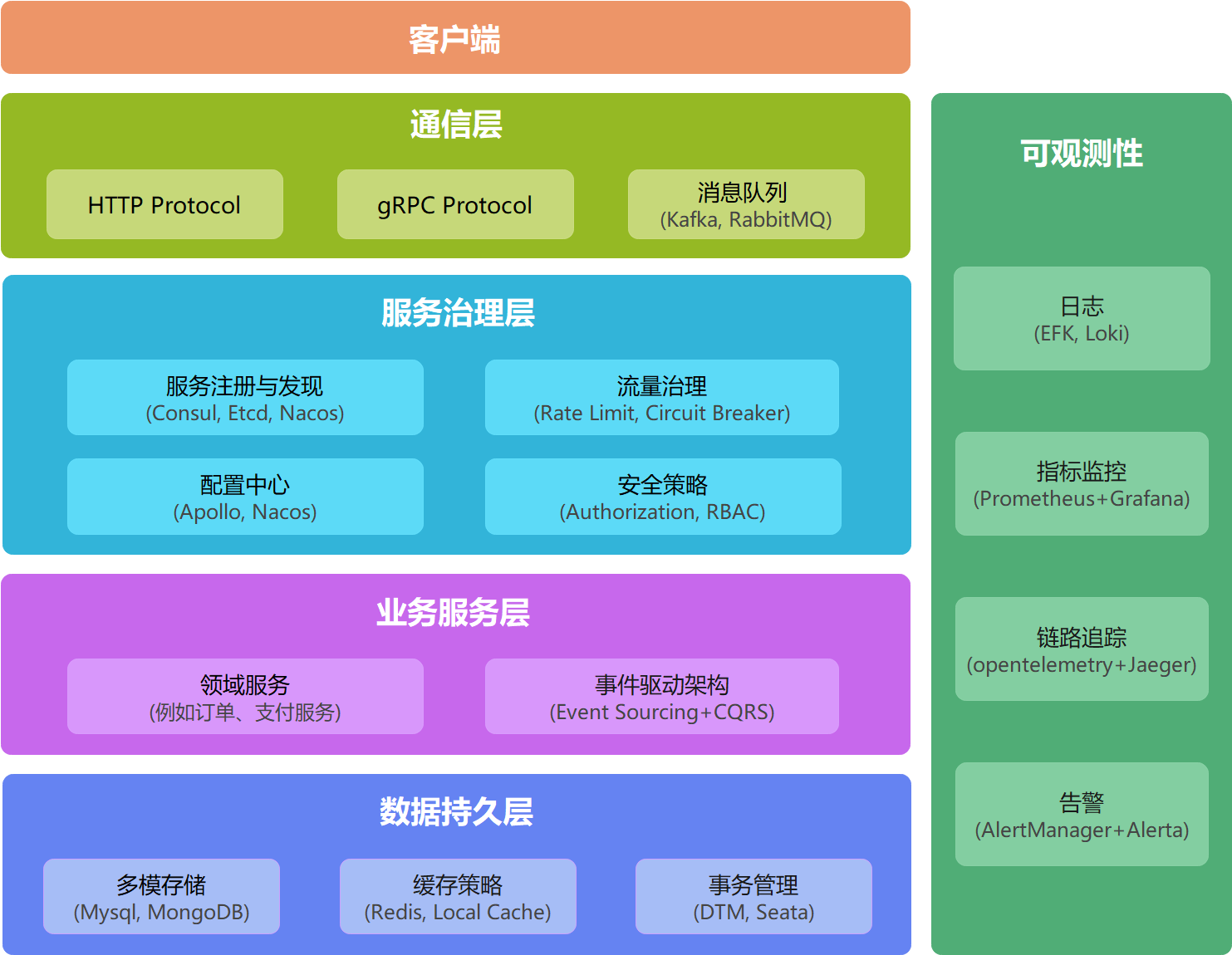
Performance testing of http and grpc service code created by the microservices framework: 50 concurrent, 1 million total requests.
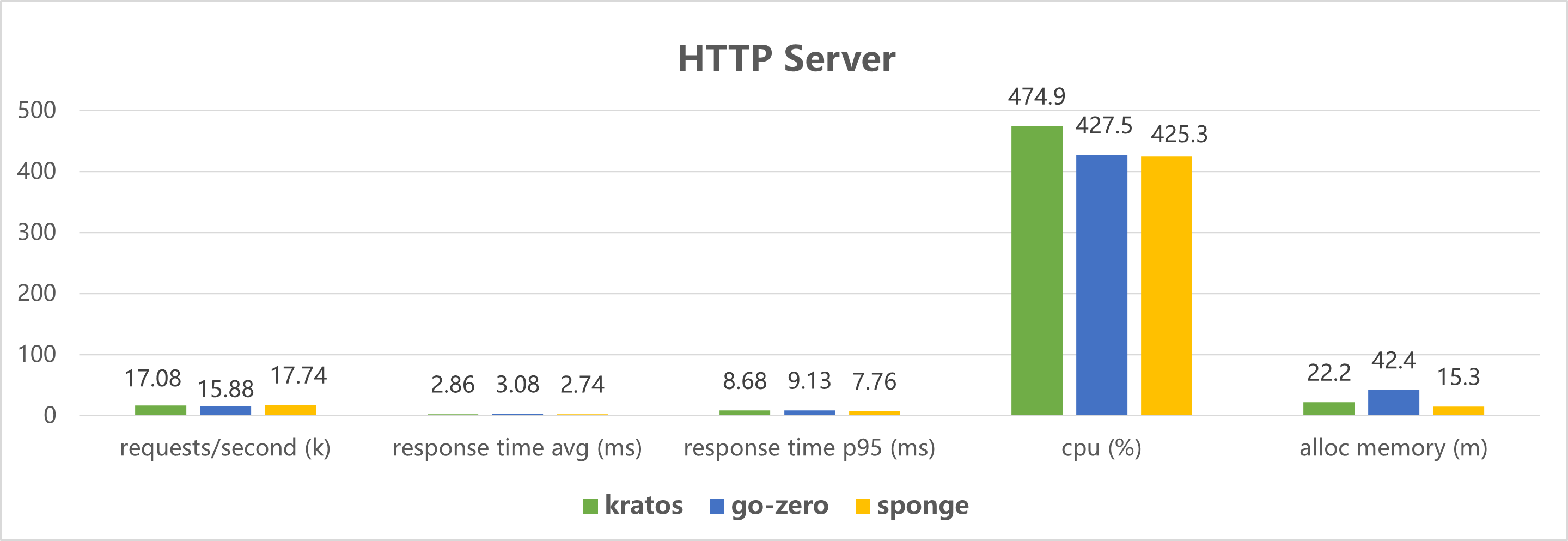
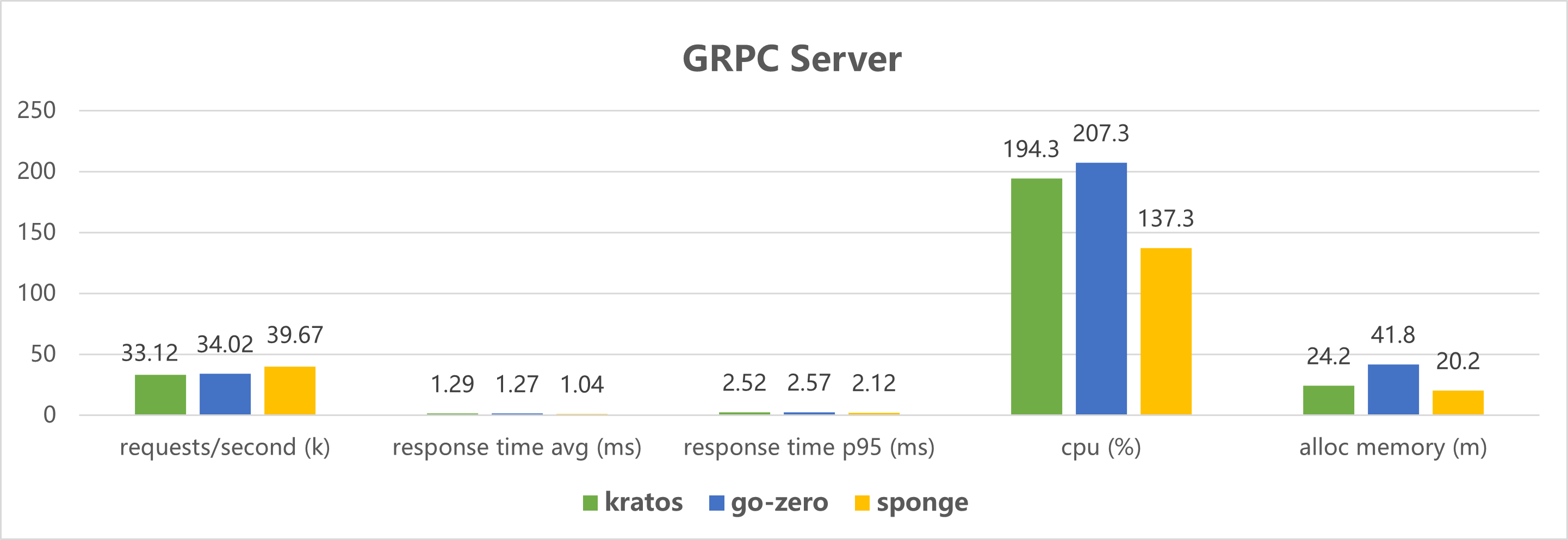
Click to view the [**test code**](https://github.com/zhufuyi/microservices_framework_benchmark).
### Project Code Directory Structure
The project code directory structure created by sponge follows the [project-layout](https://github.com/golang-standards/project-layout).
Sponge supports creating three types of project code structures: `Monolithic application monorepo (monolith)`, `Microservices multi-repo (multi-repo)`, and `Microservices monorepo (mono-repo)`.
1. The code directory structure for creating a `Monolithic application monorepo (monolith)` or `Microservices multi-repo (multi-repo)` is as follows:
```bash
.
├── api # Protobuf files and generated * pb.go directory
├── assets # Store various static resources, such as images, markdown files, etc.
├── cmd # Program entry directory
├── configs # Directory for configuration files
├── deployments # Bare metal, docker, k8s deployment script directory.
├── docs # Directory for API interface Swagger documentation.
├── internal # Directory for business logic code.
│ ├── cache # Cache directory wrapped around business logic.
│ ├── config # Directory for Go structure configuration files.
│ ├── dao # Data access directory.
│ ├── database # database directory.
│ ├── ecode # Directory for system error codes and custom business error codes.
│ ├── handler # Directory for implementing HTTP business functionality (specific to web services).
│ ├── model # Database model directory.
│ ├── routers # HTTP routing directory.
│ ├── rpcclient # Directory for client-side code that connects to grpc services.
│ ├── server # Directory for creating servers, including HTTP and grpc.
│ ├── service # Directory for implementing grpc business functionality (specific to grpc services).
│ └── types # Directory for defining request and response parameter structures for HTTP.
├── pkg # Directory for shared libraries.
├── scripts # Directory for scripts.
├── test # Directory for scripts required for testing services and test SQL.
├── third_party # Directory for third-party protobuf files or external helper programs.
├── Makefile # Develop, test, deploy related command sets .
├── go.mod # Go module dependencies and version control file.
└── go.sum # Go module dependencies key and checksum file.
```
2. The code directory structure for creating a `Microservices monorepo (mono-repo)` (large repository code directory structure) is as follows:
```bash
.
├── api
│ ├── server1 # Protobuf files and generated *pb.go directory for service 1.
│ ├── server2 # Protobuf files and generated *pb.go directory for service 2.
│ ├── server3 # Protobuf files and generated *pb.go directory for service 3.
│ └── ...
├── server1 # Code directory for Service 1, it has a similar structure to the microservice multi repo directory.
├── server2 # Code directory for Service 2, it has a similar structure to the microservice multi repo directory.
├── server3 # Code directory for Service 3, it has a similar structure to the microservice multi repo directory.
├── ...
├── third_party # Third-party protobuf files.
├── go.mod # Go module dependencies and version control file.
└── go.sum # Go module dependencies' checksums and hash keys.
```
### Sponge Development Documentation
Click to view [the detailed documentation](https://go-sponge.com/) for Sponge development project, including code generation, development, configuration, and deployment instructions, and more.
### Examples of use
#### Examples of create services
- [Create **web** service based on **sql** (including CRUD)](https://github.com/go-dev-frame/sponge_examples/tree/main/1_web-gin-CRUD)
- [Create **grpc** service based on **sql** (including CRUD)](https://github.com/go-dev-frame/sponge_examples/tree/main/2_micro-grpc-CRUD)
- [Create **web** service based on **protobuf**](https://github.com/go-dev-frame/sponge_examples/tree/main/3_web-gin-protobuf)
- [Create **grpc** service based on **protobuf** ](https://github.com/go-dev-frame/sponge_examples/tree/main/4_micro-grpc-protobuf)
- [Create **grpc gateway** service based on **protobuf**](https://github.com/go-dev-frame/sponge_examples/tree/main/5_micro-gin-rpc-gateway)
- [Create **grpc+http** service based on **protobuf**](https://github.com/go-dev-frame/sponge_examples/tree/main/_10_micro-grpc-http-protobuf)
#### Examples of develop complete project
- [Simple community web backend service](https://github.com/go-dev-frame/sponge_examples/tree/main/7_community-single)
- [Simple community web service broken down into microservice](https://github.com/go-dev-frame/sponge_examples/tree/main/8_community-cluster)
#### Distributed transaction examples
- [Simple distributed order system](https://github.com/go-dev-frame/sponge_examples/tree/main/9_order-grpc-distributed-transaction)
- [Flash sale](https://github.com/go-dev-frame/sponge_examples/tree/main/_12_sponge-dtm-flashSale)
- [E-Commerce system](https://github.com/go-dev-frame/sponge_examples/tree/main/_14_eshop)
#### Sponge+AI assistant collaborative development
- [Home appliance retail management platform](https://github.com/go-dev-frame/sponge_examples/tree/main/_15_appliance_store)
**If it's help to you, give it a star ⭐.**